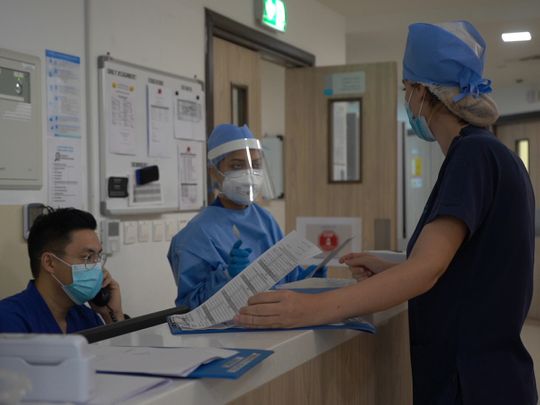
In mid-February, I took a 13-week contract to work as a nurse at Westchester Medical Centre, outside New York City. I’m a travel nurse, meaning that I work short-term contracts in health-care facilities in different parts of the country.
I thought it’d be a chance to check out Broadway, to see some museums. By mid-March, the novel coronavirus hit its peak in the state.
In my nearly 30 years as a nurse, I’d never seen anything like this disease. The hospital converted nearly all its units to treat virus patients, even opening up a wing that hadn’t been used in years just to get eight extra beds.
As long as I feel physically healthy and places need nurses, I’ll keep at this job as best as I can. But when I think about public health officials’ warnings that the pandemic has entered a new phase — that the virus has spread well beyond a few urban hot spots and now permeates rural areas of the country, too — my stomach knots up
I saw patient after patient who, no matter how much I upped their oxygen levels, kept gasping for breath. After transfer to the intensive care unit, they rarely returned.
By the time the job ended in May, I associated New York so strongly with all of the suffering and death I’d seen — all those people, of all races and ages, struggling for air — that I didn’t want to stay a day longer than I had to.
I flew back to Phoenix thinking I’d left all of that trauma behind. I told myself that the worst of the pandemic was over.
What I saw at home shocked me.
No masks in Arizona
In Arizona, almost no one wore a mask. People dined indoors at restaurants; they got together in sports bars; they swam in pools.
In New York, the pandemic felt inescapable, but here, it was as if they didn’t think the threat was real. Even if they weren’t in outright denial about the virus and didn’t believe in conspiracy theories, they behaved like they were untouchable — like the danger was distant, and it wouldn’t affect them or anyone they knew or loved.
By July, Arizona had become one of the hot spots of the pandemic, with thousands of new cases a day. I felt an awful déjà vu as, one by one, hospital units converted into coronavirus units. My phone began blowing up with requests for nurses to come to different medical facilities all over the state.
A colleague who directs the ICU at a hospital in Chinle, in the Navajo Nation, told me how common it was to see multiple members of a family, across several generations, hospitalised at the same time.
I took a contract at a long-term care facility in Yuma, near the Mexican border, where 12 out of 50 residents died of the virus. With this disease, there are few peaceful deaths.
Now that I’m back in Phoenix, working in a hospital’s coronavirus unit, I fear that America may never get this pandemic under control.
Tragedy waiting to unfold
One of my patients is a woman near retirement age; she worked at a hardware store, and after catching the virus, she got so sick that she’s been on a ventilator since June.
Compared to a few months ago, I see more people wearing masks, but a significant percentage of Americans don’t seem to understand the horror of this disease, even now.
I’ve started carrying paper surgical masks around with me, and when I see barefaced strangers at the grocery store or on public transit, I’ll sometimes offer them one and tell them a bit about my experiences as a nurse. Some just shake their heads. Others ask, “Is it really as bad as people say?” and we get to talking.
One couple started in with all of these questions — one of them had asthma and wanted to know if this made them higher risk if they got exposed to the virus. I was happy to help, but the interaction felt surreal. If people understand that the disease is dangerous, why aren’t they acting like it?
Even before the pandemic, there was a nationwide nursing shortage, and now, every day, I get text messages from staffing companies, begging health-care workers to come to Texas, to Florida.
As long as I feel physically healthy and places need nurses, I’ll keep at this job as best as I can. But when I think about public health officials’ warnings that the pandemic has entered a new phase — that the virus has spread well beyond a few urban hot spots and now permeates rural areas of the country, too — my stomach knots up.
I imagine months dragging on like this — my colleagues and I racing from place to place, desperately trying to put out the fires. I feel viscerally angry at authorities here for letting things get to this point.
— Leigh Bowie is a nurse and health care activist
Washington Post







